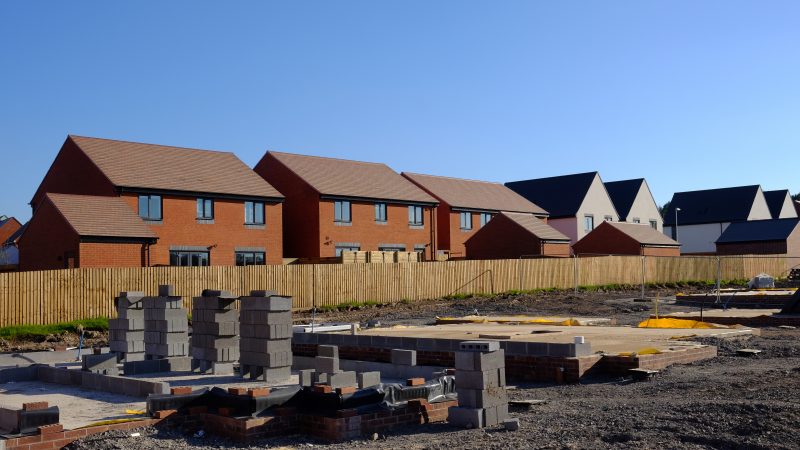
“Build Baby Build”. It was that slogan that Steve Reed wore as he proudly placed a cap on his head to wrap up his party conference speech this year.
The Planning and Infrastructure Bill bears one of the Labour government’s flagship proposals to build 1.5 million new homes by the end of the parliament.
It’s a worthy ambition, but also one that has attracted much attention and controversy.
So as the bill faces consideration of Lords amendments this week, LabourList takes you through the bill in detail and looks at what the mood on all sides of the argument is as the legislation comes to the final stages.
What does the Bill do?
According to the government website, the legislation has five main goals:
- Delivering a faster and more certain consenting process for critical infrastructure – ensuring that national infrastructure can be upgraded more easily
- Introducing a more strategic approach to nature recovery – which will include a new Nature Restoration Fund
- Improving certainty and decision-making in the planning system – aiming to help council planning committees function more efficiently
- Unlocking land and securing public value for large scale investment – allowing more sites to be used for development across the country
- Introducing effective new mechanisms for cross-boundary strategic planning – pushing for bigger picture thinking in planning
What actions might it take?
The bill will allow for several specific measures to be taken to meet the above goals.
Among these is the introduction of spatial development strategies (SDS), which will see many combined authorities work across local authority boundaries to think about planning.
It also aims to give greater streamlining to the process of getting major infrastructure projects off the ground.
Reform to Compulsory Purchase Orders is also featured.
Why has it proved controversial?
Pushback has come over allegations that the bill would see environmental protections ripped up in order to meet the vaunted housing targets.
The CPRE said last month: “We’re concerned about the continued rhetoric from government. Ministers are speaking of ‘tearing up red tape’ and ‘removing obstacles’ and taking an increasingly bullish approach which is showing little respect for scrutiny, transparency and meaningful engagement.”
Labour MPs such as Chris Hinchliff have been vocal on the matter. He recently posted: “National renewal must mean economic revival, but also cherishing what makes life beautiful. Safeguard wildlife for future generations; nature gives life its colour and vibrancy.”
Rural Labour MPs, many of whom won their seats on slight majorities last year, remain fearful that a revolt in the countryside could see the party lose dozens of seats down the line.
Why is the government pushing for it anyway?
However, the government has made planning reform a vital part of its growth agenda.
At Labour conference, Reed announced that three New Towns will begin work before the next general election – with several more planned to follow.
The target of 1.5 million new homes is one of the benchmarks against which Labour has invited the public to judge its record.
But Reed previously told the BBC: “We’ll do it by working in partnership with the developers and with the builders.
“My job is to get every barrier out of the way that is stopping that construction going ahead.”
Who in Labour supports it?
The campaign group Labour YIMBY states its aim as: “We believe the only way to solve the housing crisis is to build more homes.
“And while we finally have a government that recognises this, the obstacles remain and the opposition is as organised as ever.”
It comes as Labour has continued to push ahead with planning reform as one of the cornerstones of its governing agenda.
Who will oversee its delivery?
If it hits the statute books, planning and infrastructure will be overseen by the Ministry of Housing – and by its Secretary of State Steve Reed.
As is currently the case, many higher profile planning applications can face a public review upon appeal, and often the final decision rests in the Housing Secretary’s hands.
Subscribe here to our daily newsletter roundup of Labour news, analysis and comment– and follow us on Bluesky, WhatsApp, X and Facebook.
Share your thoughts. Contribute on this story or tell your own by writing to our Editor. The best letters every week will be published on the site. Find out how to get your letter published.
-
- SHARE: If you have anything to share that we should be looking into or publishing about this story – or any other topic involving Labour– contact us (strictly anonymously if you wish) at [email protected].
- SUBSCRIBE: Sign up to LabourList’s morning email here for the best briefing on everything Labour, every weekday morning.
- DONATE: If you value our work, please chip in a few pounds a week and become one of our supporters, helping sustain and expand our coverage.
- PARTNER: If you or your organisation might be interested in partnering with us on sponsored events or projects, email [email protected].
- ADVERTISE: If your organisation would like to advertise or run sponsored pieces on LabourList‘s daily newsletter or website, contact our exclusive ad partners Total Politics at [email protected].




More from LabourList
‘Turning public services around: Haringey’s story of child protection’
‘Can Labour turn the green tide back to red?’
Tom Belger column: ‘Why is Labour making migrant exploitation easier?’